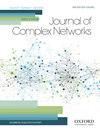An approach for analysing the impact of data integration on complex network diffusion models
IF 1.5
4区 数学
Q2 MATHEMATICS, INTERDISCIPLINARY APPLICATIONS
引用次数: 0
Abstract
Complex networks are a powerful way to reason about systems with non-trivial patterns of interaction. The increased attention in this research area is accelerated by the increasing availability of complex network data sets, with data often being reused as secondary data sources. Typically, multiple data sources are combined to create a larger, fuller picture of these complex networks and in doing so scientists have to make sometimes subjective decisions about how these sources should be integrated. These seemingly trivial decisions can sometimes have significant impact on both the resultant integrated networks and any downstream network models executed on them. We highlight the importance of this impact in online social networks and dark networks, two use-cases where data are regularly combined from multiple sources due to challenges in measurement or overlap of networks. We present a method for systematically testing how different, realistic data integration approaches can alter both the networks themselves and network models run on them, as well as an associated Python package (NIDMod) that implements this method. A number of experiments show the effectiveness of our method in identifying the impact of different data integration setups on network diffusion models.一种分析数据集成对复杂网络扩散模型影响的方法
复杂网络是对具有重要交互模式的系统进行推理的有力方法。复杂网络数据集的可用性不断增加,数据经常被用作辅助数据源,这加快了对这一研究领域的关注。通常情况下,多个数据源被结合起来,以创建一个更大、更全面的这些复杂网络的图像,在这样做的过程中,科学家有时不得不对如何整合这些数据源做出主观的决定。这些看似微不足道的决策有时会对最终的集成网络和在其上执行的任何下游网络模型产生重大影响。我们强调这种影响在在线社交网络和暗网络中的重要性,这两个用例中,由于测量或网络重叠方面的挑战,数据经常从多个来源组合在一起。我们提出了一种方法,用于系统地测试不同的、现实的数据集成方法如何改变网络本身和在其上运行的网络模型,以及实现此方法的相关Python包(NIDMod)。许多实验表明,我们的方法在识别不同数据集成设置对网络扩散模型的影响方面是有效的。
本文章由计算机程序翻译,如有差异,请以英文原文为准。
求助全文
约1分钟内获得全文
求助全文
来源期刊

Journal of complex networks
MATHEMATICS, INTERDISCIPLINARY APPLICATIONS-
CiteScore
4.20
自引率
9.50%
发文量
40
期刊介绍:
Journal of Complex Networks publishes original articles and reviews with a significant contribution to the analysis and understanding of complex networks and its applications in diverse fields. Complex networks are loosely defined as networks with nontrivial topology and dynamics, which appear as the skeletons of complex systems in the real-world. The journal covers everything from the basic mathematical, physical and computational principles needed for studying complex networks to their applications leading to predictive models in molecular, biological, ecological, informational, engineering, social, technological and other systems. It includes, but is not limited to, the following topics: - Mathematical and numerical analysis of networks - Network theory and computer sciences - Structural analysis of networks - Dynamics on networks - Physical models on networks - Networks and epidemiology - Social, socio-economic and political networks - Ecological networks - Technological and infrastructural networks - Brain and tissue networks - Biological and molecular networks - Spatial networks - Techno-social networks i.e. online social networks, social networking sites, social media - Other applications of networks - Evolving networks - Multilayer networks - Game theory on networks - Biomedicine related networks - Animal social networks - Climate networks - Cognitive, language and informational network
 求助内容:
求助内容: 应助结果提醒方式:
应助结果提醒方式:


